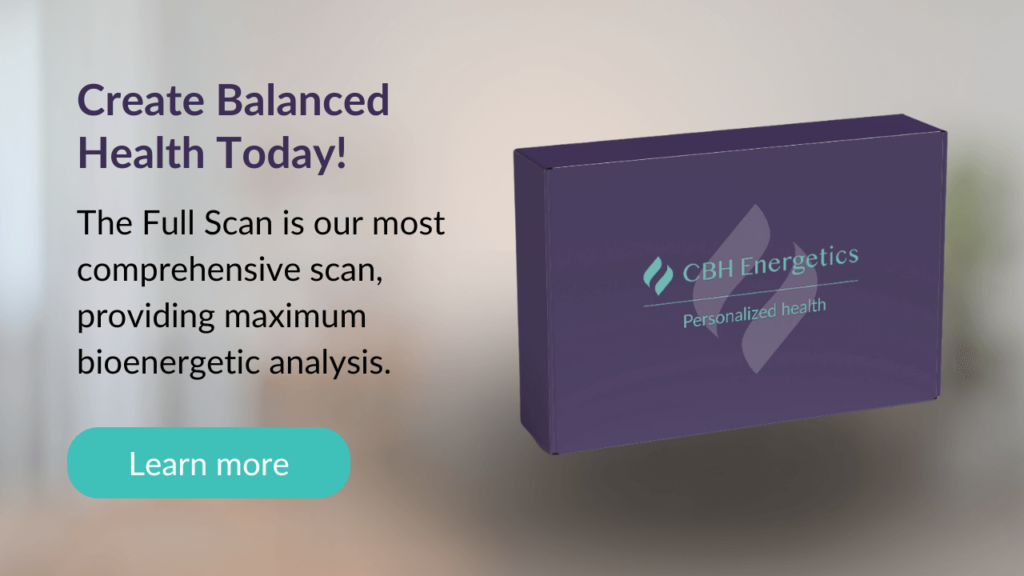
Natural Remedies and Holistic Support For Chronic Epstein-Barr Virus
Many of us have experienced the sore throat, crushing fatigue, and symptoms that come from having mono, or mononucleosis, in our teens. This sickness comes from the Epstein-Barr virus (EBV), one of the most common herpes viruses that can stay with you for life. Chronic Epstein-Barr virus (CAEBV) is where the body cannot control the virus and can stress multiple organ systems with a wide variety of symptoms.
After the initial hit from mononucleosis (caused by EBV, otherwise known as HH4 or Human Herpes 4), the virus usually stays dormant. In some instances, it can reactivate and cause the same mono symptoms as the initial infection. It can become a chronic infection, with research showing that it can lead to various health issues.
Many people search for holistic support and ways to change their lifestyle for Chronic Epstein-Barr virus, as it can be debilitating. The body systems that CAEBV can disrupt include:
- Nervous System
- Immune System
- Liver
- Spleen & Lymph
- Blood
- Joints
In this article, we’ll dive into the deeper connections between CAEBV and body systems. This is a complex virus, which makes the subtleties tough to pick up on. Holistic support, natural remedies for EBV, and bioenergetic testing can be wonderful allies for you!
If you suspect that you are dealing with Chronic Epstein-Barr virus, visit your licensed care practitioner.
Epstein-Barr Virus And Other Health Issues
One of the most highlighted conditions linked to EBV is nasopharyngeal carcinoma, which is the upper part of the throat. This type of cancer is rare, so please do not worry. Almost ALL of us have been exposed to the Epstein-Barr virus, approximately 90% of the population.
The nasopharynx joins the back of your nose to the back of your mouth. EBV is noted as a risk factor for this type of cancer and cancers of the Lymph System. Unlike traditional tests, bioresonance focuses on detecting subtle energy disturbances in your biofield and does not diagnose active infections. An EBV bioresonance pattern often simply reflects past exposure or minor energetic imbalances.
Most of us show signs of EBV infection at some point, usually in our teen years. As mentioned, for many people, the virus remains in a dormant state. Most research notes that CAEBV is rare. Perhaps it is because Chronic Epstein-Barr virus can also mimic other illnesses, such as Chronic Fatigue Syndrome, multiple sclerosis (MS), Fibromyalgia, and even some autoimmune diseases like Hashimoto’s thyroiditis. This resemblance makes it incredibly challenging to diagnose EBV from a medical perspective.
When exploring holistic support for Chronic Epstein-Barr virus, it is important to know the symptoms and the systems it can affect. This way, you can explore what homeopathic and natural remedies for EBV may fit for you.
Symptoms of both mononucleosis and CAEBV can include:
- Fever
- Fatigue
- Joint pain
- Night sweats
- Lack of appetite
- Liver involvement
- Lymphadenopathy
- Spleen involvement
- Debilitating exhaustion

The Links Between Chronic Epstein-Barr And Your Organ Systems
Since this virus can affect multiple organ systems, we’ve got a simple breakdown for you.
Nervous System
The virus may affect the Nervous System, including the brain, nerves, and spinal cord. Cranial nerves may be affected, with the facial nerve being the most common. This causes neuromuscular complications, like tingling, numbness, or drooping on one side of the mouth or cheek. On bioresonance testing, we may see governing vessel stress—a Traditional Chinese Medicine perspective, indicating an energy drain on the body.
Immune System
Your innate immunity is the first line of defense against the virus. The virus wants to take hold and replicate, and the immune system wants to destroy the virus in cells, so this can, in turn, release viral particles, with a continuing burden on the Immune System.
Liver
There are reports that EBV is a common cause of something called viral-induced liver injury. This comes from that response in the Immune System. Bile ducts may be affected in rare cases, and since bile is important for emulsifying fats in the body, digestion and nutrition can suffer.
Digestive System
EBV stays in epithelial cells in the mouth, and when the virus becomes active again, it may shed through the tissue in the mouth and into saliva. We include this here because we bioenergetically assess a point called teeth and jaw drainage in our CBH Energetics specialized form of hair and saliva testing.
Spleen & Lymph
Certain types of cells collect in lymph tissues, including the spleen. The spleen can enlarge with initial and Chronic Epstein-Barr virus. Lymph nodes can enlarge, which is part of the immune response, including immune tissue. It is important to note that this virus moves to our B cells, which can reside in the Lymph System.
Blood
In terms of bioresonance testing, the Blood System may show stress as these B cells belong to a group of white blood cells. While they may reside in lymph nodes, they are indeed blood cells that are important in immune defense. Lymphocytes may be imbalanced in the blood during both the initial stages of mono and in Chronic Epstein-Barr Virus.
Joints and the Locomotor System
Joint inflammation may be linked to chronic Epstein-Barr Virus and may be more common in women of childbearing age. When someone has rheumatoid arthritis (RA), there may be elevated EBV antibodies in the blood, and there is speculation that this virus may trigger inflammatory arthritis.
Some people also experience severe headaches, muscle aches, and difficulty concentrating, often referred to as “brain fog.” These symptoms’ unpredictability and similarity to other conditions can lead to the misreading of Chronic Epstein-Barr virus.

Bioenergetic Testing: A Non-Invasive Option for EBV
Chronic Epstein-Barr virus should not be confused with mononucleosis, often known as the “kissing disease,” also caused by the EBV organism. The symptoms of mono can be debilitating. However, they generally clear up within a few weeks or potentially a few months.
To distinguish between the two and recommend the best holistic option for Chronic Epstein-Barr virus, many holistic practitioners will bioenergetically assess your hair and saliva for the patterns of both EBV and mononucleosis. These may show up in the panel called Energetic Toxins. You can see how toxins look on a sample bioresonance report.
One factor in the reactivation of EBV or CAEBV is a stressed Immune System. If there is stress on the Immune System from things like mold exposure or Lyme disease, this opens the door for the virus to wake up and become what is called “lytic.” This term means active.
It also means that it can be contagious as well.
One of the foundational ways to support yourself if you suspect you have Chronic Epstein-Barr virus is through nutrition. While no specific “diet” for Epstein-Barr virus exists, supporting inflammation and consuming nutrient-dense, antioxidant-rich, and liver-protective foods can be a focus. Antioxidants are supportive of all body cells and liver detoxification.
Holistic Support For Chronic Epstein-Barr Virus: Nutrition
Natural remedies for EBV and CAEBV are helpful. The food you eat and your diet should come first. Many different vitamins and minerals may appear imbalanced on a report that may bioenergetically resonate with mononucleosis or EBV. Balanced nutrition can support the issues that can arise with Chronic Epstein-Barr virus. Some nutrient imbalances may include:
Zinc
This mineral supports collagen formation, the immune system, and proper mitochondrial function. Since collagen belongs to the Locomotor System, including foods high in zinc is key. Oysters, red meat, and poultry are at the top of the list. Blueberries and avocado also contain zinc. This supplement form of zinc includes anti-inflammatory turkey tail mushrooms.
Vitamin C
This helps build collagen and support the Immune System. A high dose of Vitamin C may reduce EBV antibodies. While this might be best in an IV infusion, this supplement may help the reduction of antibodies and inhibit the replication of the virus. Of course, include all foods high in Vitamin C in your diet.
Vitamin D
Lack of this vitamin, or hormone, may be linked to impaired control of Epstein-Barr Virus. Include eggs, fatty fish, and fortified beverages where possible.
Selenium
This compound is an antioxidant with anti-inflammatory properties. It also supports the thyroid, which chronic EBV can impact. One or two Brazil nuts are high in selenium.
Fatty Fish
The Omega-3 group of fats protects the nervous system and overall inflammation. Don’t like fish? There are many Omega-3 Fatty Acids in supplement form!
Natural Remedies for EBV And Chronic Epstein-Barr Virus
Supplements and herbs for wellness and support during flares. Having an array of choices means that they can be matched to the person’s unique needs. The potential for supplements to boost your immune system, reduce inflammation, and alleviate symptoms can help you live with day-to-day fatigue and pain.
Always consult your healthcare provider before starting any new supplement regimen.
Supplements Include:
NAC: Otherwise known as N-acetylcysteine, NAC is liver-protective and provides the precursor to glutathione, considered the body’s master antioxidant. The health benefits of NAC are numerous, including brain protection.
Lysine: A supplement used to support the Immune System against different types of herpes virus, including Epstein-Barr virus. Lysine is an excellent supplement for chronic EBV.
Herbal Remedies include:
Echinacea: This plant supports the immune system with its antiviral properties.
Astragalus: This liver-protective and immune-boosting plant comes in many remedies; however, since EBV may affect the spleen, Spleen Chi may work well for many CAEBV clients.
Licorice: Glycyrrhizic acid (a component of licorice root) may slow EBV’s replication. Many Remedy Scans balance with Licro Intrinsic.
Olive Leaf: This herbal complex may have a protective effect when the cycle of EBV goes from latent to lytic (reactivates).
Adaptogens: Ashwagandha, Rhodiola, and Medicinal Mushrooms can help support the adrenal glands and the HPA axis, often under stress in chronic illnesses.
Lifestyle Changes To Support Chronic Epstein-Barr Virus
Managing any condition or virus isn’t just about supplements and medications. Lifestyle changes can play an essential role in your overall well-being.
- Prioritize rest and sleep. Your body needs time to heal. Adequate sleep is also crucial for proper immune function.
- Nourishment. Including nutrient-dense foods in your holistic support plan can help support your immune system and overall health. The Mediterranean diet helps with inflammation and is nutrient-dense.
- Gentle exercise. Gentle movement can be a holistic option for Chronic Epstein-Barr Virus as it boosts mood and energy levels. It will also create lymph drainage. However, it’s important not to overdo it, as this can lead to a symptom flare-up.
- Stress management techniques. Meditation, deep breathing, and yoga can help lower stress levels and work towards boosting your success in creating balanced health.

Top Tips and Takeaways
Living with Chronic Epstein-Barr virus can be challenging, but it’s important to remember that you’re not alone. There are online communities and support groups that can offer advice, share experiences, and provide a sense of camaraderie.
Community can be helpful, as no specific antiviral treatment for CAEBV exists. Remember that it’s okay to ask for help and to take time for self-care. It’s also important to educate yourself about the condition. Understanding the virus will increase your confidence in deciding on natural remedies for EBV.
For persistent lingering issues, the EBV Series Symptom Relief Kit from DesBio helps support your immune system in balancing and decreasing the impact of EBV. As a holistic support for CAEBV, this kit may help alleviate the symptoms that affect daily living.
Reach out to others with this condition if you want to make lifestyle changes or try supplements. You’re not alone in this journey, and with perseverance and support, you can feel better by considering bioresonance testing as a holistic support for the Chronic Epstein-Barr virus.

